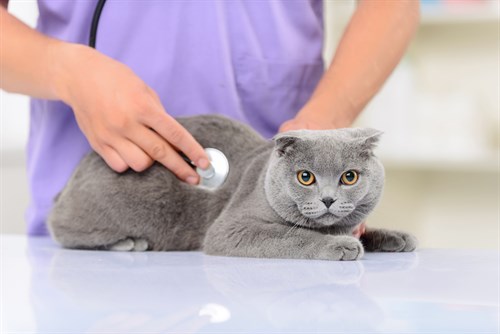Pet Wellness

Taking care of our pets is a year round commitment. However, caring for our animals is more than simply making sure they have food, water, and shelter each day. Making sure pets visit their veterinarian for regular check-ups is vital to their overall wellness as well.
October is National Pet Wellness Month. Sponsored by The American Veterinary Medical Association and Fort Dodge Animal Health, National Pet Wellness month is intended to promote awareness about the pet aging process, disease prevention, and the importance of pet wellness exams.
Many people adopt the misguided belief that unless your pet is clearly ill or injured there is no reason to take them to the veterinarian. Just because your pet is not displaying discomfort, does not mean it is healthy. Visiting your pet’s veterinarian for wellness exams can potentially prevent health problems, lead to early detection of health issues that could become problematic, and find existing problems that may be corrected.
“Make sure your pets see their veterinarian at least once a year. Once your animals reach their “senior” years they should be getting wellness exams every six months,” explains Dr. Mark Stickney, the Director of General Surgery Services at the Texas A&M University College of Veterinary Medicine’s Teaching Hospital.
Of course what is considered “senior” for pets is drastically different from that of humans. Stickney explains that “senior” is defined differently for different animals. Average sized dogs and cats usually are considered to be senior pets once they turn seven. Large breeds of dogs are classified as senior after their fifth birthday.
“Our pets age faster than we do. Therefore, diseases develop faster in them. For example, an illness that could take years to affect a human can develop in dogs in a few months,” states Stickney. “Our pets cannot tell us when something is wrong with them; scheduling regular wellness exams can help detect and treat illnesses early.”
According to Stickney, during a wellness exam the veterinarian is checking: the pet’s body condition(not too fat or skinny), the muscular skeletal system to make sure there is no muscle wasting that could mean they are not using certain muscles because it is painful, if the heart and lung functions sound normal, the abdomen and organs to make sure they are normal in size and not causing the animal pain, the lymph nodes are normal sized and symmetrical, the condition of the eyes, ears, and teeth, no unexpected lumps or bumps, and no skin or internal parasites.
It is important to tell your veterinarian if your pet has been displaying any abnormal behavior. Changes in sleeping patterns, eating habits, obedience, and displays of aggression can be signs of a bigger problem.
“Though some illnesses are unavoidable, there are some diseases that we can prevent our pets from contracting by simply getting them immunized. Though rabies is the only vaccination required by law, veterinarians recommend a few other vaccinations for our cats and dogs,” notes Stickney.
Common vaccinations for dogs include Parvovirus, Distemper, Parainfluenza, and Adenovirus. Cats should be vaccinated for Feline Herpes, Calicivirus, and Panleukopenia.
According to Stickney, series of vaccinations generally begin when a puppy or kitten is between eight and twelve weeks old. These series are scheduled about three weeks apart until they are around twenty weeks old. At one year old, pets should go in for booster shots.
Because there are no set rules for when and what to immunize your pet for, it is best to talk with your veterinarian about creating and maintaining a vaccination plan that works best for your pet.
“We are able to treat more illness in animals than ever before,” states Stickney. “Taking your pet in for their wellness exams can give them longer, better, and happier lives. Yearly visits to the veterinarian are a small price to pay for our pets’ companionship.”
Pet Talk is a service of the College of Veterinary Medicine & Biomedical Sciences, Texas A&M University. Stories can be viewed on the Web at vetmed.tamu.edu/news/pet-talk. Suggestions for future topics may be directed to editor@cvm.tamu.edu.
Angela G. Clendenin
Director, Communications & Public Relations
Ofc – (979) 862-2675
Cell – (979) 739-5718


